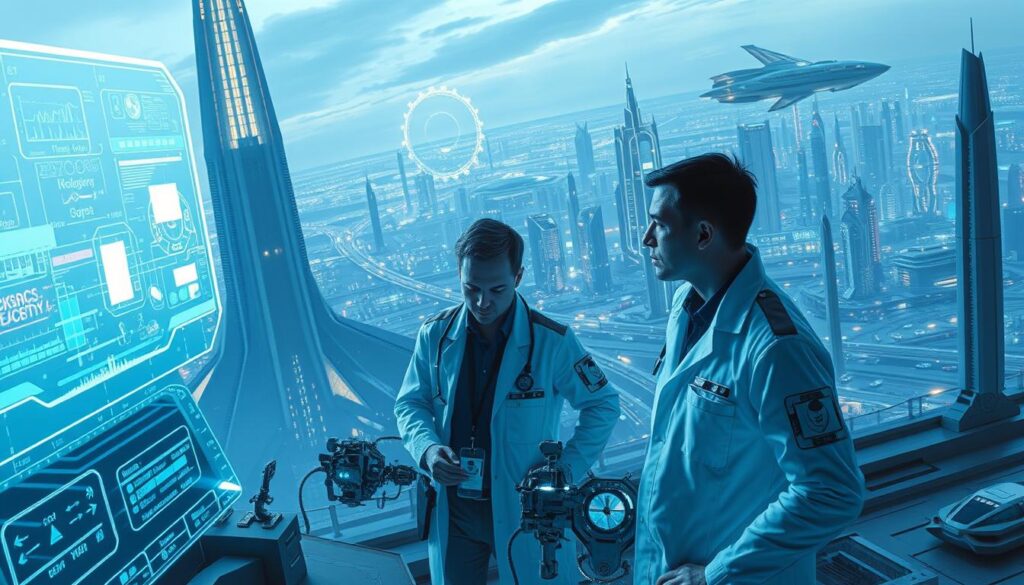Books That Accurately Foretold the Future, Literary prophecies have long fascinated readers. Many books predicted the future, showing the power of human imagination. Science fiction and dystopian tales have warned us about technology and society.
Predictive literature is a big part of our culture. Authors, unknowingly, have shaped our future with their stories. Their prophecies have inspired innovation and changed how we think.

Many readers are interested in books that predicted the future. They want to know how authors foresaw events and technologies. The world of predictive literature is vast and interesting.
Books that predicted the future have shaped our understanding of the world. They continue to inspire and influence us today.
Literary Prophecies and Their Impact
Predictive literature has greatly influenced our view of the world. Authors use their writing to comment on current events and predict the future. Literary prophecies are a powerful tool for social commentary.
Many authors have unintentionally become futurists through their writing. The study of books that predicted the future is fascinating. Scholars and readers alike are drawn to it.
Key Takeaways Books That Accurately Foretold the Future
- Literary prophecies have been a part of our cultural heritage for centuries
- Books that predicted the future have had a significant impact on our understanding of the world
- Predictive literature is a powerful tool for social commentary
- Many authors have unintentionally become futurists through their writing
- The study of literary prophecies is a fascinating topic that continues to inspire and influence us today
- Literary prophecies have become an integral part of our understanding of the world
The Fascinating World of Literary Prophecies
Predictive literature is a key part of science fiction. Authors like Isaac Asimov and Arthur C. Clarke have made science fiction predictions that have come true. They predicted the rise of robots and computers, showing great literary foresight.
This genre includes science fiction, dystopian fiction, and speculative fiction. Each offers unique views of possible futures.
George Orwell’s 1984 is a classic example of a dystopian warning. It shows a surveillance society that feels too close to our own. Ray Bradbury also predicted the impact of technology on society. By looking at these predictions, we can see how literature reflects and shapes our beliefs and fears.
Exploring the Genres of Predictive Literature
- Science fiction: explores the potential consequences of scientific and technological advancements
- Dystopian fiction: depicts a futuristic world that has been ravaged by war, environmental disaster, or other catastrophes
- Speculative fiction: encompasses a broad range of genres, including science fiction, fantasy, and horror, to explore the potential consequences of human actions
Understanding the different types of literary predictions helps us see the importance of predictive literature. It shapes our view of the world and its possible futures, Books That Accurately Foretold the Future.
Jules Verne’s Technological Prophecies
Jules Verne is famous for his science fiction predictions that showed many technological advancements. He predicted submarines, space travel, and modern air travel. His books, like “Twenty Thousand Leagues Under the Sea” and “From the Earth to the Moon,” were not just stories. They also showed inventions that would come true years later.
Verne’s technological foresight was amazing. His work still inspires people to think creatively and innovate. Some of his key predictions include:
- Submarines: Verne’s stories about underwater vessels in “Twenty Thousand Leagues Under the Sea” were spot on, even with the technology of his time.
- Space travel: In “From the Earth to the Moon,” Verne guessed that rockets would take us to the moon. This was seen as science fiction back then.
- Modern air travel: Verne’s ideas about flying in his novels were ahead of his time, given the early days of aviation.
Verne’s impact on science fiction predictions and technological foresight is clear. His work still motivates scientists, engineers, and innovators today. His ability to envision and predict future tech makes him a legend in science fiction.
Books That Accidentally Predicted the Future: From Fiction to Reality
Predictive literature has always captivated readers. Many authors have made accidental prophecies that have come true. This shows the amazing power of literary foresight. Writers often catch the mood of their time and imagine possible futures.
Morgan Robertson’s “Futility” is a great example. It eerily predicted the sinking of the Titanic. This shows how authors can see things before they happen.
George Orwell is another author known for literary foresight. His book “1984” showed a world of constant surveillance. This idea is sadly very real today. Ray Bradbury also predicted the digital age in his works. His visions have turned into reality.
- Morgan Robertson’s “Futility” and its prediction of the Titanic’s sinking
- George Orwell’s “1984” and its depiction of a surveillance society
- Ray Bradbury’s visions of the digital age in his various works
These examples show the incredible power of literary foresight. They also highlight how accidental prophecies can become real.
Scientific Breakthroughs Predicted in Literature
Literature has always been a place for predicting scientific breakthroughs. Authors use their imagination to suggest future technologies and discoveries. Science fiction predictions have greatly inspired real-world innovation and guided scientific research.
Many authors focus on technological advancements in their work. They explore space exploration, medical discoveries, and other scientific areas. Looking at these predictions helps us understand literature’s role in shaping our world. It also shows how science fiction predictions can drive real-world innovation.
Some notable examples of scientific breakthroughs predicted in literature include:
- Space exploration and colonization
- Advances in medical technology and disease treatment
- Development of artificial intelligence and robotics

Exploring the link between literature and science shows the power of technological advancements. As we explore new scientific knowledge, it’s exciting to see how science fiction predictions will continue to influence and reflect our understanding of the world.
Social and Political Predictions That Came True
Many authors have predicted our current social and political landscape. Their literary prophecies warned us about totalitarian regimes, consumer culture, and technology’s impact. Authors like Aldous Huxley, William Gibson, and Margaret Atwood have been especially insightful, offering dystopian warnings that still resonate today.
Some notable examples of social predictions include:
- The rise of consumerism and the effects of mass production on individual freedom
- The growth of cyberculture and the impact of technology on our relationships and identities
- The dangers of totalitarian regimes and the erosion of civil liberties
These literary prophecies remind us of literature’s power to shape our world view. They warn us about the consequences of our actions. By examining these dystopian warnings and social predictions, we can better understand our society’s challenges. We see the need to protect our freedom and individuality.
Understanding the Impact of Literary Prophecies
Authors like Margaret Atwood and William Gibson give us a unique view of our future. Their social predictions are both thought-provoking and timely. By exploring these literary prophecies, we gain insight into our society’s complex issues. We understand the importance of protecting our freedom and individuality.
Modern Literature’s Current Predictions
Modern literature is full of predictions about the future. It shows our hopes and fears today. Through modern predictive literature, authors share their views on what’s to come. They talk about climate change, new tech, and social issues.
Some books and authors are leading the way in contemporary foresight. They focus on big themes and predictions. These include:
- Environmental degradation and the impact of human activity on the planet
- The rise of artificial intelligence and its potential consequences for society
- The ongoing struggle for social justice and equality
Looking at these predictions helps us understand today’s world better. Modern predictive literature and contemporary foresight guide us through today’s challenges. They help us imagine possible futures.
The Impact of Predictive Literature on Society
Predictive literature has deeply influenced society. It goes beyond just entertainment. It shapes our culture and inspires new minds in science, writing, and thinking. The predictive literature’s impact is seen in many parts of our lives, from tech to social movements.
Its power comes from inspiring innovation. Many authors have predicted future events and tech that later became real. For example, Jules Verne’s ideas on space travel and submarines inspired scientists and engineers. This led to big breakthroughs in these areas.
Some key areas where predictive literature has made an impact include:
- Technological advancements: Authors like Jules Verne and H.G. Wells predicted tech like space travel, robots, and computers.
- Social movements: Works like George Orwell’s “1984” and Margaret Atwood’s “The Handmaid’s Tale” sparked social and political movements. They warned us about totalitarianism and oppression.
- Cultural discourse: Predictive literature has shaped our future imagination. It influences how we talk about AI, climate change, and sustainability.
In conclusion, the influence of literature and predictive literature’s impact on society is clear. As we face the modern world’s challenges, we must see the power of predictive literature. It inspires, educates, and warns us about our actions’ possibilities and consequences.
When Authors Become Unwitting Futurists
Many authors have become futurists without meaning to. They predicted events, technologies, and changes in society that later happened. This shows the power of literary foresight, where authors’ stories predict what’s to come. By looking at these authors’ lives and works, we can understand how they came up with these visions.
Authors who predict the future have a big impact on us. Writers like Jules Verne and George Orwell foresaw tech and social changes that came true. Their stories show how literary foresight can inspire and warn us about our actions.

Being seen as a futurist comes with big responsibilities and challenges. Authors must think about how their predictions affect readers and society. As futurists, they can shape our view of the world and inspire good change. By embracing their role, authors can help create a better future for everyone.
Some key aspects of authors as futurists include:
- Predicting technological advancements and societal changes
- Inspiring innovation and shaping our understanding of the world
- Considering the potential impact of their predictions on readers and society
Some books that accidentally predicted the future are just as fascinating as historical events that repeated in eerie ways.
Conclusion: Books That Accurately Foretold the Future
The legacy of predictive literature shows how words can shape our view of the future. Authors like Jules Verne and Margaret Atwood have inspired many. They’ve made us think about what’s possible and what we should be ready for.
Even if their exact predictions didn’t happen, their work has sparked our imagination. It has made us question our views of tomorrow. This is crucial as we face the fast-changing world of today.
Looking ahead, the wisdom from these authors can guide us. It encourages us to use our creativity and face the future with hope and curiosity.
FAQ
What is predictive literature?
Predictive literature is fiction that guesses what the future might hold. It often appears in science fiction, dystopian, and speculative fiction. These stories can predict future events, technologies, or changes in society.
How have authors become accidental prophets?
Many authors have unknowingly predicted the future through their stories. They are called “accidental prophets.” Their creative visions have helped shape our future, inspire new ideas, and influence culture.
What types of literary predictions can be found?
Predictive literature covers a wide range of topics. It includes predictions about technology, science, social changes, and warnings about the future. Authors like Jules Verne and Aldous Huxley have shown us what might come next.
How have literary prophecies impacted society?
Predictive literature has a big impact on society. It has inspired innovation, shaped our culture, and motivated future thinkers. Authors who predict the future face big challenges and responsibilities.
What are some examples of modern literature’s current predictions?
Today’s authors are still making predictions about the future. They write about climate change, new technologies, social issues, and political dangers. Their works reflect our current fears and hopes.
Source
- https://time.com/5380613/books-predict-future/
- https://theweek.com/book-list/1023596/7-sci-fi-books-that-seem-to-predict-the-future
- https://www.goodreads.com/list/show/111118.Books_That_Predicted_The_Future
- https://www.rd.com/list/books-that-predicted-the-future/
- https://www.youtube.com/watch?v=fzOEHwCVuj8
- https://www.reddit.com/r/books/comments/172kn1a/what_are_the_best_examples_of_books_throughout/
